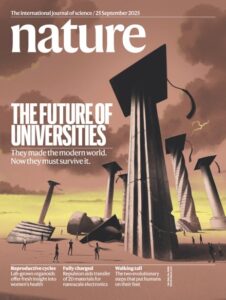- Opinion
- 10 de October de 2025
- No Comment
- 8 minutes read
University under threat, neglected education?

Photo: Walter Frehner / Pixabay
A classroom reflection on Nature’s recent editorial in a special issue on the future of the university


Universities around the world face strange and challenging times. Beyond political pressures and vested interests, there is a growing social scepticism, seeping through social media and increasingly polarised and politicised traditional news outlets.
In this context, it is heartening to hear strong, reasoned voices from the scientific and academic arenas, urging both reflection and, crucially, action. In a recent editorial in Nature, part of a compelling special issue on the future of the university, entitled with a phrase as categorical as it is hopeful—“Universities are — and must continue to be — a force for good”—the journal reminds us that universities, beleaguered by budget cuts, political interference, the unsettling rise of artificial intelligence, and ongoing tensions over academic freedom, cannot succumb to social discouragement. They must resist and persist. Perhaps, reading between the lines, the editorial speaks primarily of the United States, though its message resonates far more widely.
Fortunately, the Nature editorial calls on universities to embrace fresh ideas, abandon inertia, and dare to experiment with new structures. More than a warning, it reads as a hymn: despite the storm, despite the wear, higher education institutions still possess—and indeed bear the duty—to be a social force for the common good. And what Nature urges of universities can also inspire the schools that educate our young: future citizens, researchers, scientists, engineers, thinkers, and artists. Universities flourish only if, earlier in compulsory education, curiosity, motivation, interest, and above all, students’ dreams have been nurtured.
Nature places the university at the centre of the narrative, as if it were both the origin and the culmination of social transformation. Yet, while recognising the crucial role of universities—where knowledge and learning should rise to their highest human expression—it must not be forgotten that the university is only one peak in a far broader educational landscape. Forgive me, but education has other peaks too, such as vocational and technical training.
The pre-university stage, compulsory education, is not a passive waiting room but a decisive space where habits of thought, ethical dispositions, and future vocations are forged. Universities arrive too late if secondary education fails to spark curiosity, ignite imagination (and that enables students to picture themselves in their future), cultivate critical thinking and creativity, and, of course, teach students to navigate a complex world and socialise peacefully.
Passionate defence of the need to preserve and renew the university is essential. Yet Nature neglects to acknowledge that its vitality depends on what happens beforehand: on schools capable of sowing the seeds that universities will later harvest. That omission reveals an elitist perspective, glorifying a particular culmination of the educational path without attending to the journey that makes it possible, nor to those left behind or who chose alternative personal and existential paths.
Drawing on Wolff (2017) and the Nature editorial, I venture to extrapolate some of its suggestions to pre-university education, emphasising the centrality of knowledge and scientific evidence—something Nature itself should highlight when proposing educational improvements:
- Evidence-based innovation: Pre-university teaching should embrace new methodologies, but always guided by scientific evidence rather than fleeting trends or commercial interests.
- Connecting schools to society through knowledge: Engagement with the wider community only makes sense when it occurs through projects that transmit rigorous, assessable knowledge—where students learn—rather than turning schools into mere venues for periodic social events.
- Resources for learning: Innovation in pre-university education demands investment in libraries, technologies, and teacher training grounded in solid research. Scientific journals play a crucial role in identifying high-quality studies.
- Fostering scientific, technological, and ethical literacy: Pre-university education must cultivate critical thinking and scientific and technological literacy, laying the foundation for responsible citizenship. Ethics must never be sidelined or treated as secondary.
- Assessment beyond numbers: If education encompasses three dimensions—teaching, learning, and evaluation, measuring must assess knowledge, processes, and competencies across all dimensions, following research-backed standards (Mayer, 2023), rather than focusing solely on quantitative outcomes. Assessment is not mere grading.
Nature paints an inspiring vision of the university as an engine of the common good. Yet the same challenges—innovation, autonomy, societal engagement, funding, critical thinking, and liberation from narrow metrics—apply across all educational levels. If universities are to remain a force for good, schools must be too: spaces where students truly learn, not merely graduate; spaces where thinking, questioning, creating, and transforming are prioritised over rote completion and credentialism.
Universities must remain beacons in a turbulent world, spaces of free knowledge and dialogue, territories of innovation responding not only to scientific logic, encyclopaedic knowledge, or technological dreams, but above all to societal needs—and, why not, to champion the usefulness of the useless. Let them also be humanist refuges, utopian cracks for those besieged by daily life, shelters in the storm, and hymns to freedom.
References:
Nature editorial board (2025). Universities are — and must continue to be — a force for good. Nature 645, 821 (2025), doi: https://doi.org/10.1038/d41586-025-03065-w
Mayer, R. (2023). Aplicando la ciencia del aprendizaje. Graó.
Wolff, R. (2017). The ideal of the university. Routledge.
Source: educational EVIDENCE
Rights: Creative Commons

